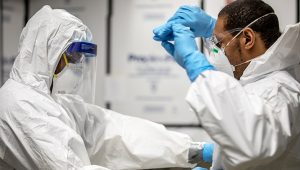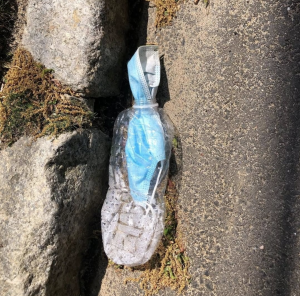We’ve Become Less Mindful of the Footprints We Leave Behind
If there is one certainty these days, it’s that the coronavirus pandemic has changed the way we navigate the world. As we become more mindful of how we can become vectors of disease spread, we’ve become less mindful of the footprints we leave behind, in particular with our plastic footprints. Now that global society is prioritizing sterilized items above all else, more plastic gloves than ever end up in the trash after a trip to the grocery store, more plastic cutlery is disposed of after a single sitting, and more “insert single-use item here” is disregarded at first drop for fear that it is now contaminated.

Plastic as medical protective and sanitary gear. Photo: Miguel Pena
It’s easy to forget about the impact our choices have when our daily habits shift and countries slow down around us. Because of their omnipresence and disposability, we often use plastics without thinking about it. Beyond us as individuals, the increase in plastics is sometimes justified: a great deal of PPE and medical equipment is made with plastic. As medical facilities are overwhelmed by Covid-stricken patients, demand for such equipment has skyrocketed. In some places, supply has fallen short and medical facilities have had to get crafty—in mid-April, New York City officials sought rain ponchos to use as gowns for the medical personnel in the city’s hospitals.
Regardless, the collective mental shift away from the impact of our plastic consumption is concerning. In many places grocery stores have set temporary bans on the use of reusable bags, citing concern that the bags (as well as other reusable items) may contribute to the spread of Covid-19. In other areas, like California, authorities lifted bans on plastic bags they had already put in place. The increase in carry-out orders at restaurants nationwide has come with an exponential increase in single-use plastics as people continue to support cafes and restaurants.

A classic example of human irresponsibility during COVD. Photo: The Island Now
As we toss away the plastic waste, we may frown, express internal disquiet, quietly lament the ecological impact we are exchanging for perceived safety and economic stimulation – and who can blame us? There’s a pandemic on the prowl and our first priority is – well – ourselves. And even beyond ourselves, we can’t ditch our local businesses during hard times.
Already, the masks and gloves we mindlessly toss away, emblematic of the pandemic, have made their way into the environment. Footage from divers in France shows an ocean floor littered with gloves and masks. In the mere weeks since gloves and masks became commonplace, they have swiftly joined the billions of tons of plastic already in the oceans.
The irony of disposable plastic is that it survives forever. Plastics are indifferent to the pandemic – they will continue to accumulate in the oceans, where they will persist for centuries and even when ground down they become microplastics that both bioaccumulate and biomagnify in the marine food chain, which will in turn work their way into the human diet. The effects of microplastics on human health are not yet well understood, but in the United States, Americans consume tens of thousands of microplastic particles each year.
Furthermore, in the face of the existing economic crisis, corporations – certainly more so than individuals – are struggling to limit their plastic waste and follow through on their commitments to reduce. Recycling plans and sustainability efforts can be expensive, and as revenue falls and employees are furloughed, such plans and efforts may lose priority. Society therefore must continue to demand that corporations minimize the plastics in the supply chain and on an individual basis, opt for reusables.
Because so much of the plastic recycling industry is international, with wealthy, high waste-generating nations exporting plastic waste to less developed countries, particularly in Southeast Asia, the national and global restrictions on travel and labor have reduced recycling activities. The world’s millions of waste pickers – people who salvage waste for resale or consumption – play a role in mitigating pollution, but national lockdowns have made it more challenging for them to work. Without this informal economy of people who remove plastic waste from landfills and other sites, the buildup of waste is more likely to result in plastic entering waterways.
The crisis of plastic waste is at its core complicated, but our anxieties about the pandemic have added a layer to the problem. As we have socially distanced to prevent the spread, it seems we may too have mentally distanced from crises like that of plastic waste. It is difficult and taxing to focus our attention on one pervasive global problem, much less several. In a mere few months, the social order of the world has undergone dramatic shifts, but we must not let ourselves forget that our actions still have impact, nor that we still can make changes that positively affect our planet. In fact, perhaps the shift in our daily lives forced on us by the pandemic allows us the perspective to better understand the changes we can make.

The pandemic is far from over, and the future of how Covid-19 will continue to impact us is not well understood. Instead of allowing ourselves to use it as an excuse to slip into our old habits, we can regard it as an opportunity to reimagine ourselves, not just by learning to play the guitar or run more miles, but by shifting in our societal behavior to make long-lasting changes that phase plastic waste out of our lives. For many of us, the pandemic has made the world a bleaker place, but that doesn’t mean we can’t strive for a cleaner future. Now, more than ever, we have been afforded the space to decide who it is we want to be.

256 discarded masks and gloves, thrown to the ground. Photo: Janis Selby Jones
Henry Haney is a freelance writer based in North Carolina who writes stories with a particular focus on community environmental issues.

Trackback: kurvana
Trackback: รับจำนำมือถือใกล้ฉัน
Trackback: pgslot
Trackback: หวยธกส เพื่อคนไทย แทงได้ไม่อั้นบนเว็บ LSM99
Trackback: sci diyalaa
Trackback: weed in copenhagen
Trackback: Dental1